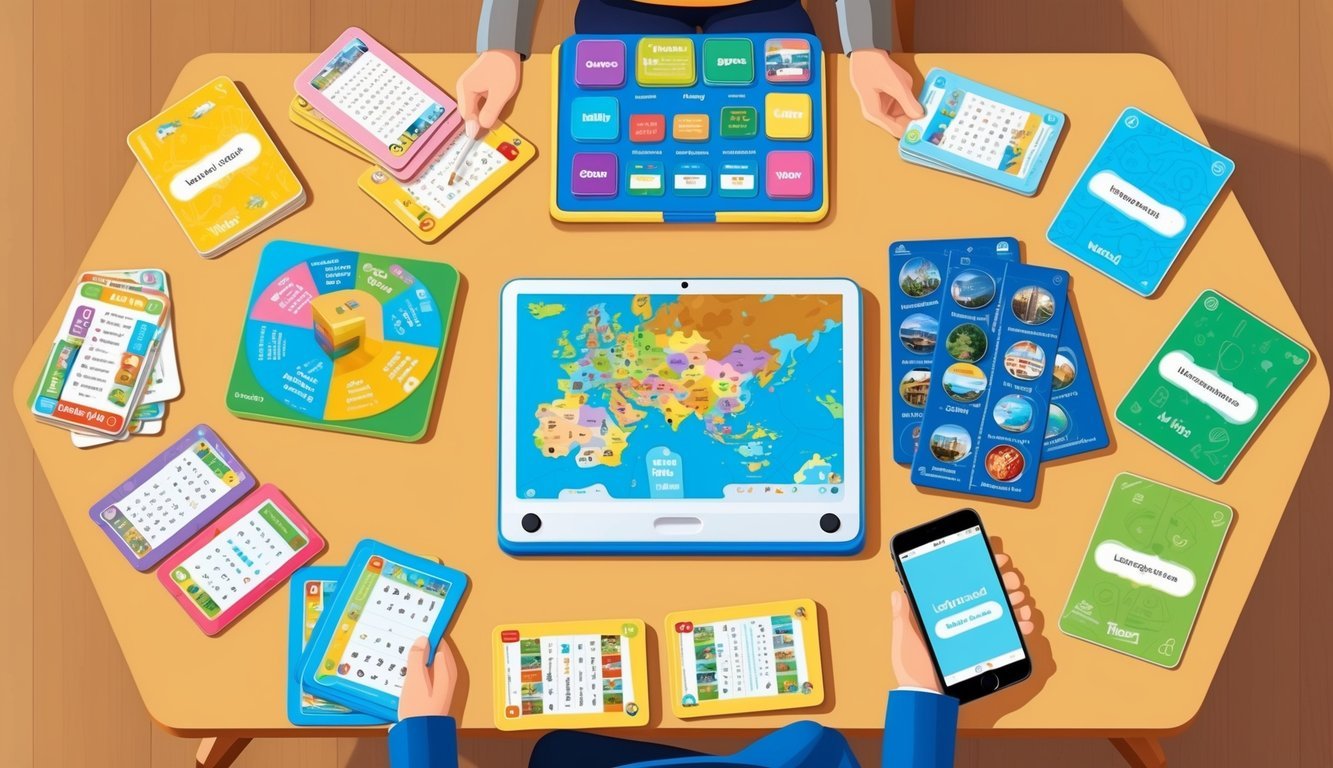Want to make learning a new language fun and effective? Language learning games are the way to go! These interactive activities turn studying into an enjoyable experience, helping you pick up vocabulary, grammar, and more without even realizing it.
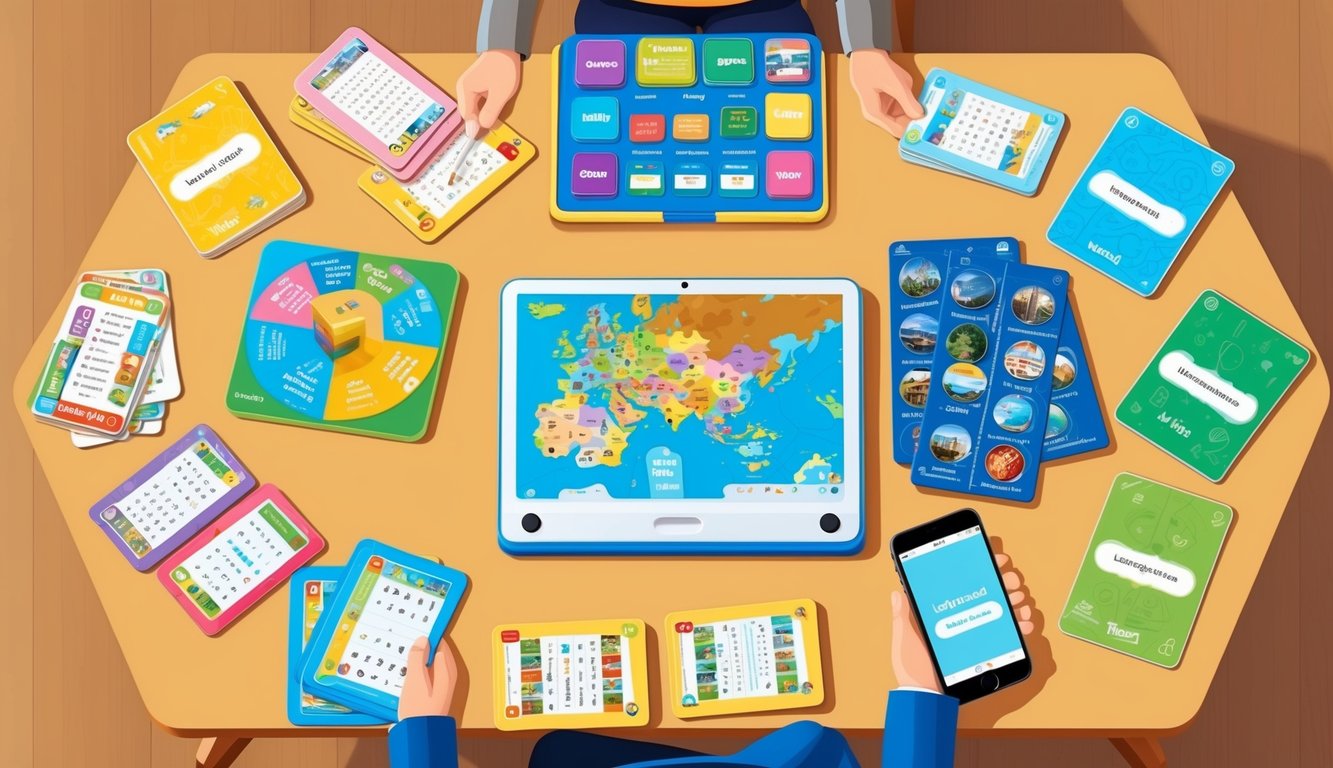
By incorporating games into your language learning routine, you can boost retention and motivation while having a blast. From classic board games adapted for language practice to modern apps and online platforms, there’s something for every learner.
You can play charades to practice verbs, use flashcards for quick vocabulary drills, or dive into immersive video games in your target language.
Ready to level up your language skills? Try out some language learning games and watch your proficiency soar.
Whether you’re a beginner or advanced learner, these games offer a refreshing approach to mastering a new tongue.
Get ready to have fun while expanding your linguistic horizons!
The Appeal of Language Learning Games
Language learning games offer a fun and effective way to boost your skills.
They combine entertainment with education, making the process of acquiring a new language more enjoyable and less daunting.
Boosting Motivation
Games make learning a language feel less like work and more like play.
You’ll find yourself eager to practice, even during your free time.
The competitive elements in many games push you to improve and outperform others or your previous scores.
Rewards and achievements in games give you a sense of progress.
Seeing your virtual character level up or earning points for correct answers can be incredibly satisfying.
This positive reinforcement keeps you coming back for more.
Games often use repetition in a way that doesn’t feel boring.
You might encounter the same vocabulary or grammar points multiple times, but in different contexts or challenges.
This helps reinforce your learning without feeling tedious.
Engaging Different Learning Styles
Language learning games cater to various learning preferences.
Visual learners benefit from colorful graphics and on-screen text.
Auditory learners can enjoy games with spoken dialogue and pronunciation challenges.
Many games incorporate physical actions, perfect for kinesthetic learners.
Think of charades or games where you have to act out words.
These activities help you connect language with movement, making it more memorable.
Games often combine multiple elements like reading, listening, and speaking.
This multi-sensory approach helps you develop well-rounded language skills.
You might read instructions, listen to audio cues, and then speak your answer – all within a single game.
Interactive elements in games encourage active participation.
Instead of passively absorbing information, you’re constantly making choices and receiving immediate feedback.
This hands-on approach can significantly boost your retention of new language concepts.
The Appeal of Language Learning Games
Language learning games offer a fun and effective way to boost your skills.
They combine entertainment with education, making the process of acquiring a new language more enjoyable and less daunting.
Boosting Motivation
Games make learning a language feel less like work and more like play.
You’ll find yourself eager to practice, even during your free time.
The competitive elements in many games push you to improve and outperform others or your previous scores.
Rewards and achievements in games give you a sense of progress.
Seeing your virtual character level up or earning points for correct answers can be incredibly satisfying.
This positive reinforcement keeps you coming back for more.
Games often use repetition in a way that doesn’t feel boring.
You might encounter the same vocabulary or grammar points multiple times, but in different contexts or challenges.
This helps reinforce your learning without feeling tedious.
Engaging Different Learning Styles
Language learning games cater to various learning preferences.
Visual learners benefit from colorful graphics and on-screen text.
Auditory learners can enjoy games with spoken dialogue and pronunciation challenges.
Many games incorporate physical actions, perfect for kinesthetic learners.
Think of charades or games where you have to act out words.
These activities help you connect language with movement, making it more memorable.
Games often combine multiple elements like reading, listening, and speaking.
This multi-sensory approach helps you develop well-rounded language skills.
You might read instructions, listen to audio cues, and then speak your answer – all within a single game.
Interactive elements in games encourage active participation.
Instead of passively absorbing information, you’re constantly making choices and receiving immediate feedback.
This hands-on approach can significantly boost your retention of new language concepts.
Choosing the Right Language Games for Beginners
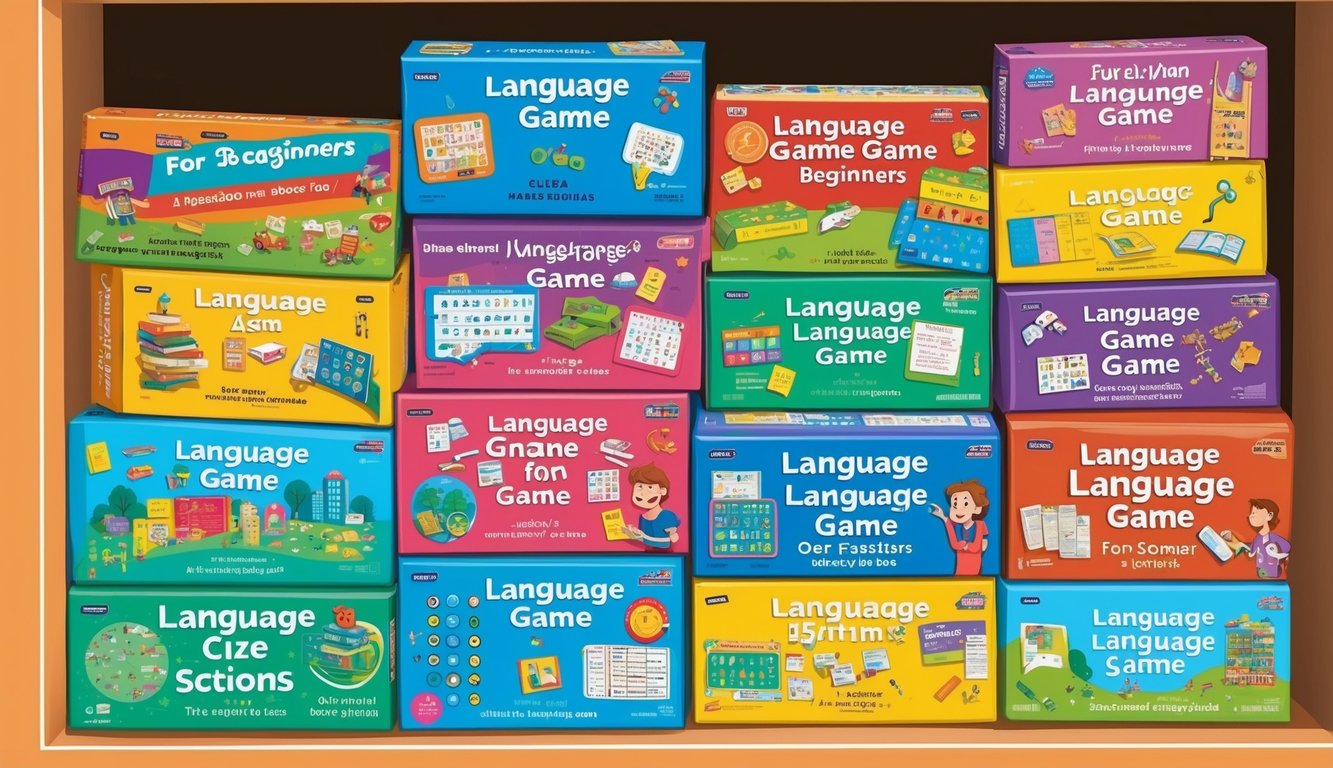
Picking suitable language games can jumpstart your learning journey.
Focus on activities that build core skills while keeping you engaged and motivated.
Start with simple yet effective options tailored to newcomers.
Memory Boosting with Flashcards
Flashcards are a classic tool for a reason.
They help you memorize vocabulary quickly and efficiently.
Create your own sets with words and phrases you want to learn, or use pre-made decks.
Mix things up by adding images to one side for visual associations.
Try timed challenges to test yourself.
Set a goal to learn 5-10 new words daily.
Review your cards regularly to reinforce your memory.
Digital flashcard apps like Anki or Quizlet offer spaced repetition features to optimize your learning schedule.
Interactive Apps like Babbel
Language learning apps make studying fun and convenient.
Babbel is a popular choice for beginners.
It offers bite-sized lessons you can complete in 10-15 minutes.
The app focuses on practical conversations and real-life scenarios.
You’ll practice reading, writing, listening, and speaking skills.
Babbel uses speech recognition to help improve your pronunciation.
Set aside time each day to complete a lesson or two.
Track your progress and celebrate small wins.
Many apps offer gamification elements like points and streaks to keep you motivated.
Basic Grammar and Vocabulary Fun
Start with simple games that reinforce fundamental concepts.
Word searches help you recognize new vocabulary.
Crossword puzzles challenge you to recall words and their meanings.
Try “Simon Says” to practice basic commands.
It’s a great way to learn verbs and body parts.
Play “I Spy” to work on descriptions and adjectives.
Create vocabulary lists for different themes like food, colors, or animals.
Use these lists to play guessing games or memory matches.
Don’t forget to say words out loud to practice pronunciation.
Language Games for Intermediate Learners
Language games offer engaging ways to enhance your skills as an intermediate learner.
They provide opportunities to practice vocabulary, pronunciation, and language use in enjoyable, interactive formats.
Expanding Vocabulary with Crosswords
Crosswords are excellent tools for boosting your vocabulary.
You’ll encounter new words and reinforce existing knowledge as you solve clues.
Try themed crosswords focused on specific topics like business, technology, or culture to target vocabulary in your areas of interest.
Look for intermediate-level crosswords in language learning apps or websites.
Start with easier puzzles and gradually increase difficulty.
Keep a notebook handy to jot down unfamiliar words and their meanings.
Challenge yourself by attempting to complete crosswords without a dictionary.
This pushes you to recall words from memory, strengthening your vocabulary retention.
Perfecting Pronunciation Through Repetition
Repetition games can significantly improve your pronunciation skills.
Try tongue twisters designed for intermediate learners.
Start slow, focusing on accuracy, then gradually increase your speed.
Record yourself saying challenging phrases and compare them to native speaker recordings.
This helps identify areas for improvement.
Play “echo” with a language partner or tutor.
They say a phrase, and you repeat it, mimicking their intonation and rhythm.
This game sharpens your ear and helps you replicate native-like pronunciation.
Practice shadowing by listening to podcasts or audiobooks and repeating what you hear in real-time.
This improves your overall fluency and accent.
Exploring Language with Scrabble
Scrabble is a fantastic game for intermediate learners to expand vocabulary and practice spelling.
Play with a bilingual dictionary to discover new words and their meanings.
Challenge yourself to create longer words or use more complex letter combinations.
This pushes you to recall and apply less common vocabulary.
Try themed Scrabble rounds where all words must relate to a specific topic.
This helps you practice vocabulary in context and reinforces word associations.
Keep a list of new words you encounter during gameplay.
Review and use them in sentences to solidify your understanding and expand your active vocabulary.
Advanced Language Game Strategies
Language games for advanced learners push boundaries and foster deeper linguistic skills.
They challenge you to think on your feet and apply complex language concepts in creative ways.
Challenging Native Speakers with Kloo
Kloo is an innovative card game that can level the playing field between advanced learners and native speakers.
You’ll find yourself constructing sentences using color-coded cards, each representing different parts of speech.
The game encourages quick thinking and creative language use.
As an advanced learner, you can challenge native speakers by focusing on more complex sentence structures and obscure vocabulary.
Try to incorporate idiomatic expressions or regional slang to really test your skills.
Kloo’s flexibility allows you to adjust difficulty on the fly, making it perfect for mixed-ability groups.
Complex Grammar Games for Advanced Learners
Advanced grammar games dive deep into the intricacies of language structure.
You might tackle games focusing on conditional tenses, subjunctive mood, or complex clause structures.
One effective game involves creating a story chain.
Each player adds a sentence, but it must use a specific grammatical structure.
This forces you to apply advanced concepts in context.
Another challenging option is “Grammar Jenga.” Each block contains a grammar rule or exception.
As you remove blocks, you must use that rule in a sentence.
It’s a fun way to recall and apply complex grammar points under pressure.
These games push your language skills to new heights, helping you approach native-like fluency in your target language.
Digital Language Learning Game Advantages
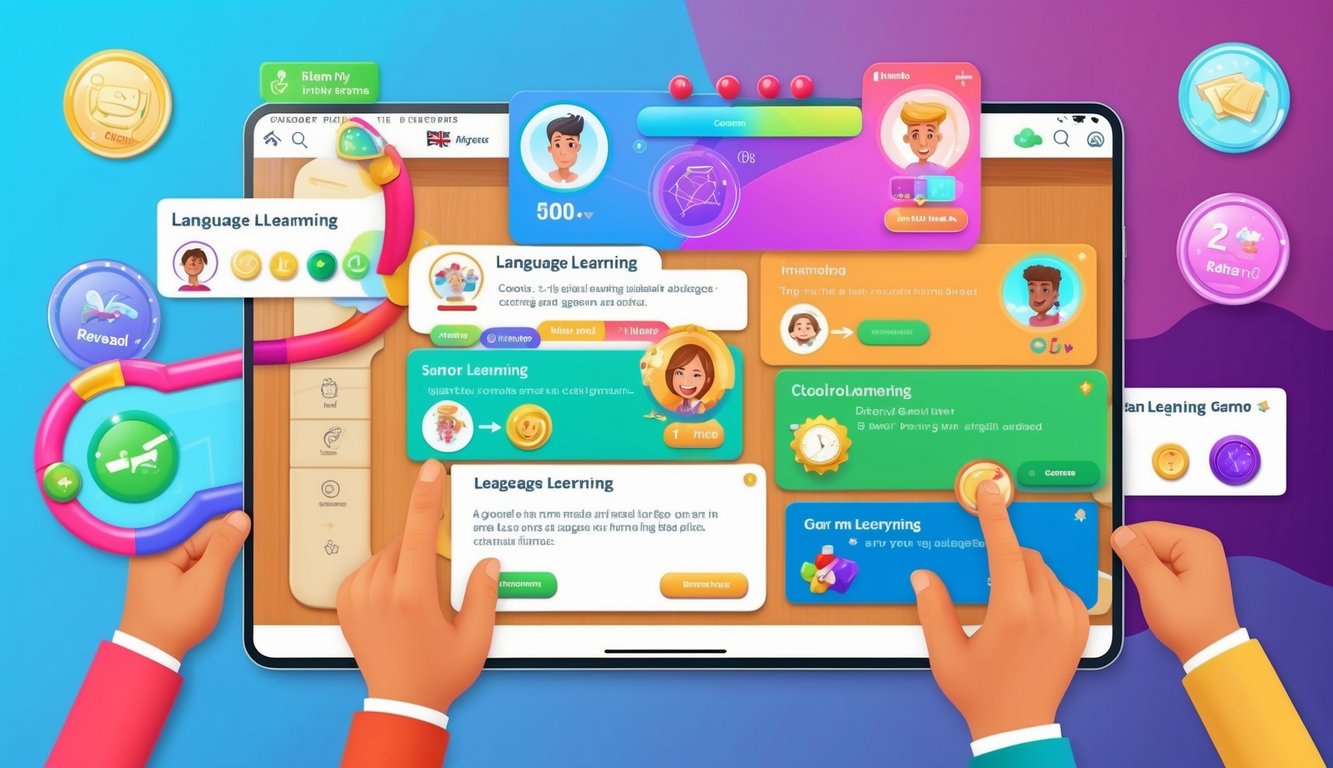
Digital games offer engaging ways to boost your language skills.
They make learning fun and interactive while providing immersive practice environments.
Leveraging Apps for Language Learning
Language learning apps put a world of vocab and grammar at your fingertips.
Try Duolingo or Babbel to practice bite-sized lessons on the go.
These apps use gamification to keep you motivated with points, levels, and rewards.
Many feature speech recognition to help perfect your pronunciation.
You can set daily goals and track your progress over time.
Some apps even let you chat with native speakers to practice real conversations.
This hands-on approach builds confidence in using your new language skills.
The Role of Video Games in Language Acquisition
Video games create rich virtual worlds ripe for language immersion.
Playing games with foreign language audio and subtitles exposes you to natural speech patterns and colloquialisms.
RPGs and adventure games often feature extensive dialogue, expanding your vocabulary.
Action games can improve your reaction time when hearing foreign words.
Try changing your console or PC language settings for a full immersion experience.
Online multiplayer games let you practice with native speakers worldwide.
Gaming communities and forums provide opportunities to discuss games in your target language.
This reinforces what you’ve learned through active use.
Educational Mini-Games Online
Web-based mini-games offer quick, focused language practice sessions.
Sites like Digital Dialects feature colorful games targeting specific skills.
Try matching games to build vocabulary or sentence scrambles to practice grammar.
Timed challenges add excitement while testing your knowledge.
Many sites offer games across multiple languages, letting you explore new tongues.
Leaderboards and high scores add a competitive element to keep you coming back.
These games work well for short study breaks or when you have a few spare minutes.
They complement more structured learning methods by making repetition fun.
Physical Language Learning Games
Physical games can make language learning more engaging and memorable.
They get you moving while practicing vocabulary and grammar in a fun, interactive way.
Using Board Games to Learn a Foreign Language
Board games are a great tool for language learners.
They provide a structured environment to practice speaking and listening skills.
Popular options include Scrabble in your target language or specially designed language learning board games.
These games often focus on specific skills like vocabulary building or verb conjugation.
As you play, you’ll naturally use the language to discuss rules, take turns, and interact with other players.
Some games use visual elements to help reinforce new words.
Others incorporate challenges that require you to form sentences or describe objects in the target language.
Card Games Like Taboo and Opposites
Card games offer a portable and versatile way to practice language skills.
Taboo is especially effective for expanding your vocabulary and finding creative ways to express ideas.
In Taboo, you try to get your team to guess a word without using certain related terms.
This pushes you to think of synonyms and descriptive phrases in your target language.
Opposites is another fun card game for language learners.
It helps you practice antonyms and expand your vocabulary range.
You match cards with opposite meanings, reinforcing word relationships.
These games can be easily adapted to different skill levels.
Beginners might use simpler words, while advanced learners can tackle more complex vocabulary and phrases.
Cultural Immersion Through Games
Games offer a fun way to dive into another culture and language.
They let you experience customs, traditions, and ways of thinking in an interactive format.
Spanish language board games can be particularly effective for immersing yourself in Hispanic culture.
Engaging with Spanish Language Board Games
You’ll find tons of Spanish board games that can boost your language skills and cultural knowledge.
Try “¡Lotería!” – it’s like bingo but with colorful Mexican images.
As you play, you’ll pick up vocab and learn about traditional symbols.
“Scrabble en Español” challenges you to form Spanish words, expanding your vocabulary.
It’s a great way to practice spelling and learn new terms.
For a taste of Spanish history, check out “El Camino de Santiago.” This game takes you on a journey through northern Spain, teaching you about the famous pilgrimage route.
Don’t forget party games like “Tabú en Español.” It’ll have you describing words without using certain terms – a perfect way to improve your speaking skills.
These games do more than teach language.
They give you a peek into Spanish-speaking cultures, making learning feel less like work and more like fun.
Social Language Learning

Language games become even more fun and effective when played with others.
Interacting with real people boosts motivation and provides authentic practice opportunities.
The Role of Multiplayer in Language Practice
Multiplayer language games create an immersive environment for practicing your target language.
You get to use the language in real-time conversations, improving your speaking and listening skills.
Games like online charades or virtual bingo sessions challenge you to think on your feet.
These multiplayer experiences often simulate real-world scenarios, preparing you for actual interactions.
You’ll learn to navigate conversations, ask for clarification, and express yourself more naturally.
Competitive elements in multiplayer games can spark your competitive spirit, pushing you to expand your vocabulary and improve your language skills.
The social aspect also helps reduce anxiety about making mistakes, as everyone is learning together.
Language Learning with Friends and Family
Involving friends and family in your language learning journey can be incredibly rewarding.
You can organize game nights featuring language-focused activities like charades or bilingual board games.
This creates a supportive and encouraging environment for practice.
Playing language games with loved ones helps reinforce your learning and makes the process more enjoyable.
You can challenge each other, share new words, and celebrate progress together.
It’s a great way to bond while improving your language skills.
Try incorporating language games into your daily routines.
For example, you could play a quick round of “I Spy” in your target language during meal times or car rides.
These small, consistent efforts can lead to significant improvements over time.
Techniques for Effective Learning Game Use
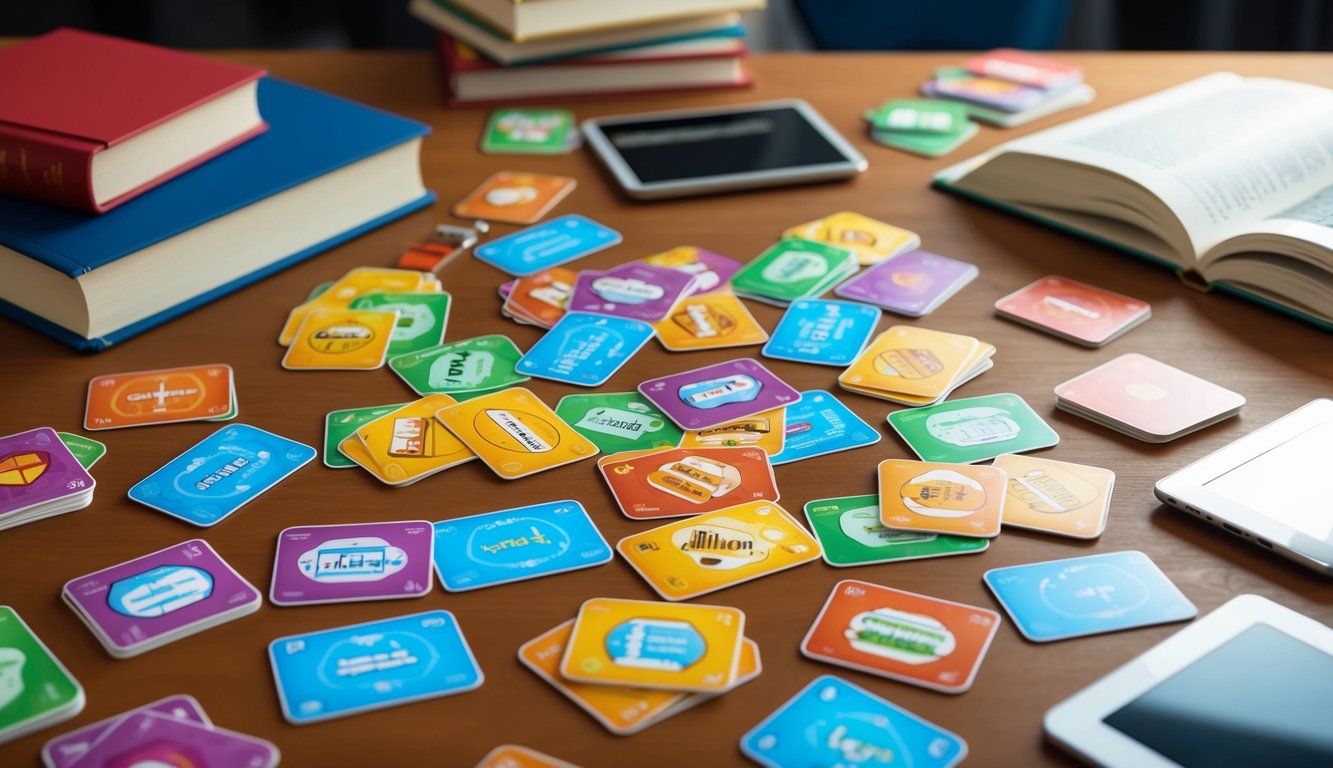
Language learning games can supercharge your skills when used strategically.
The right approach makes all the difference in maximizing their benefits for your language journey.
Incorporating Verb Conjugation Games
Verb conjugation games are a fun way to tackle one of language learning’s trickiest aspects.
Try apps like Conjuguemos or Duolingo’s timed practice sessions to drill those tricky verb forms.
Set daily goals for yourself, like mastering one new tense or irregular verb each day.
Mix it up by playing with friends or classmates.
Create friendly competitions to see who can conjugate the most verbs correctly in a set time.
This adds a social element and keeps you accountable.
Remember to focus on the verbs you’ll use most often in real conversations.
Quality trumps quantity here.
Mastering Vocabulary with Repetitive Play
Repetition is key to locking new words into your long-term memory.
Games like Memrise or Quizlet offer spaced repetition systems that help you review words at optimal intervals.
Create your own custom flashcard decks with words you encounter in daily life.
Include images or example sentences to provide context and boost retention.
Challenge yourself with timed games to improve recall speed.
Start with shorter time limits and gradually increase as you improve.
Don’t forget to use your new vocab in real conversations.
Try describing your day using only words from your latest game session.
This practical application cements your learning.
Evaluating Language Learning Game Effectiveness
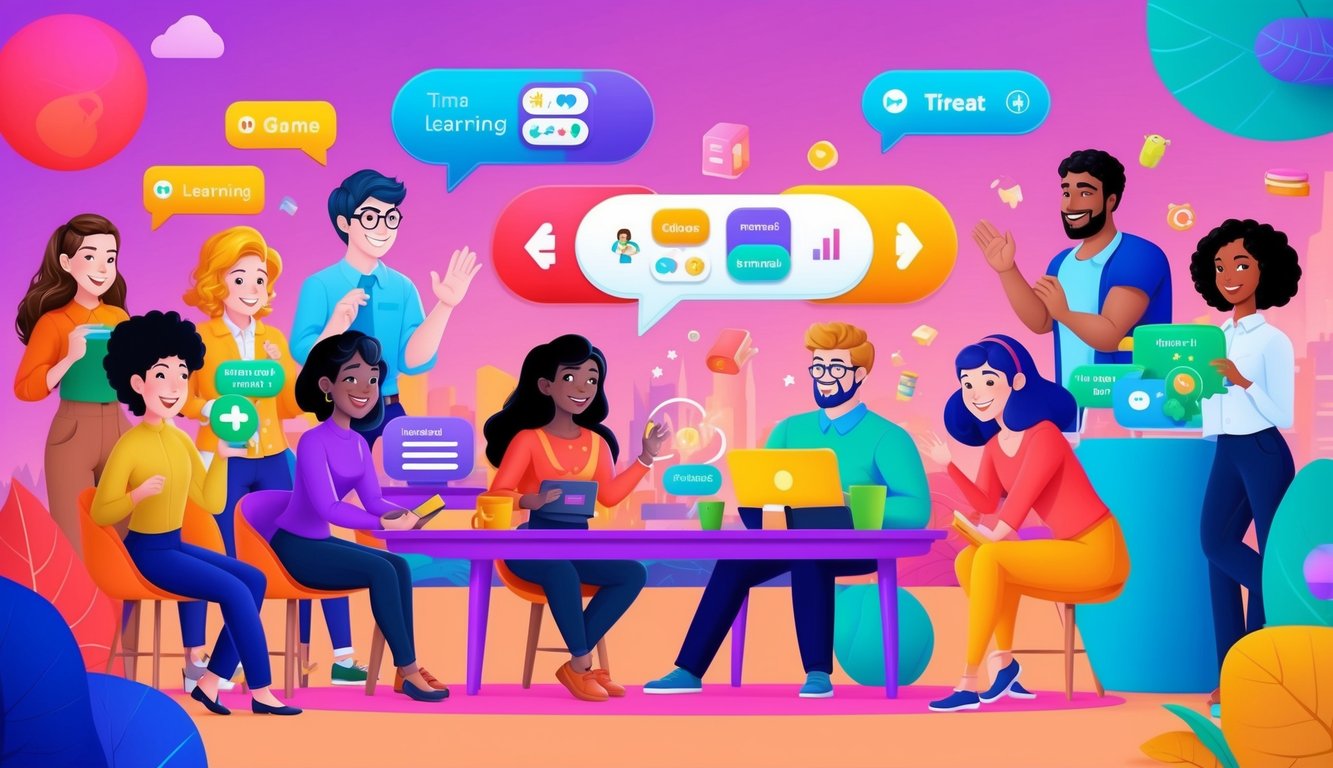
Language learning games offer unique ways to measure progress and engage learners.
Effective games incorporate key elements that boost language acquisition and retention.
Assessment of Progress Through Games
Language learning games often include built-in assessment tools.
You’ll find quizzes, level-up systems, and progress trackers that show your advancement.
These features give you instant feedback on your performance.
Some games use adaptive algorithms to adjust difficulty based on your responses.
This personalized approach ensures you’re always challenged at the right level.
Many apps offer detailed analytics.
You can see which language areas you excel in and where you need more practice.
This data helps you focus your efforts and set achievable goals.
Game Elements That Enhance Learning
Immersive storylines draw you into the game world.
This makes language practice feel natural and fun.
You’ll encounter new vocabulary and grammar in context, improving retention.
Rewards and achievements keep you motivated.
Earning points, unlocking new levels, or collecting virtual items gives you a sense of accomplishment.
Multiplayer features let you practice with others.
You can compete or collaborate with fellow learners.
This boosts engagement and provides real-world language use opportunities.
Visual and audio cues reinforce learning.
Matching pictures to words or hearing native pronunciations helps you connect language to real-life situations.

